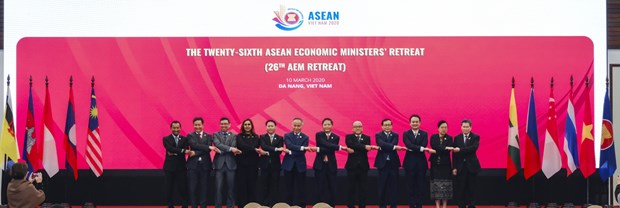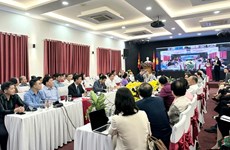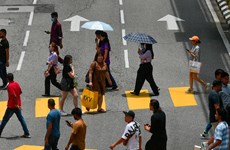AEM Retreat issues joint statement on economic resilience to COVID-19
 Delegates at the event (Photo: vir.com.vn)
Delegates at the event (Photo: vir.com.vn)
In the joint statement, the ministers
expressed concerns over the outbreak of the acute respiratory disease caused by
the novel coronavirus SARS-CoV-2 (COVID-19), which has affected the lives of
people as well as economies around the world.
They emphasised the “importance of
ASEAN solidarity and the spirit of a cohesive and responsive ASEAN community in
facing the outbreak of COVID-19 and similar challenges”.
The ministers acknowledged the current
efforts of each ASEAN member nation, ASEAN agencies and other economies in
containing the spread and impacts of COVID-19, and commended contributions of
medical and non-medical staff in assisting people affected by the epidemic.
The ministers recognised the adverse
impacts of the COVID-19 outbreak on the economy, including the tourism,
manufacturing, retail, and other service sectors, as well as the disruption of
supply chains and the financial markets.
They emphasised the urgent need for
concerted efforts to avoid further adverse impacts in the global economy
brought about by the COVID-19 outbreak.
The ministers proclaimed that countermeasure
restrictions on cross-border movements should be based on public health
considerations and should not unnecessarily restrict trade within the region.
They also agreed to take a collective
course of action to mitigate the economic impacts of COVID-19 and resolved to
remain committed to keeping the ASEAN market open for trade and investment as
well as increasing regional information sharing and coordination efforts in
responding to the economic challenges resulting from the COVID-19 outbreak.
The actions aim to establish close
rapport with industry stakeholders to reinforce confidence in Southeast Asia as
a trade and investment hub and tourism destination in the region and make the
most of technologies and digital trade to allow businesses, especially the
micro-, small-, and medium-sized enterprises (MSMEs) to continue operations
amidst the COVID-19 outbreak
Besides, the ministers also vowed to
strengthen resilience and sustainability of the supply chains through the promotion
of better transparency and agility, and the implementation of the Master Plan
on ASEAN Connectivity 2025 (MPAC).
The ministers affirmed to enhance
ASEAN economic cooperation with external partners to include initiatives aimed
at strengthening regional supply chains to make them more resilient and less
vulnerable to internal and external shocks.
They highlighted the need to build on
existing trade facilitation platforms in the ASEAN, such as the ASEAN Single
Window (ASW), to promote and support supply chain connectivity and refrain from
actions that can create unnecessary inflationary pressures or adversely impacts
on food security in the region, and endeavour to ensure the availability of
basic goods and commodities.
The ASEAN should also take measures to
continue addressing non-tariff barriers, particularly those that impede the
smooth flow of goods and services in supply chains and refrain from imposing
new and unnecessary non-tariff measures, the joint statement noted.
The Association of Southeast Asian Nations (ASEAN) comprises 10 member countries, namely Brunei, Cambodia, Indonesia, Laos, Malaysia, Myanmar, the Philippines, Singapore, Thailand and Vietnam./.












